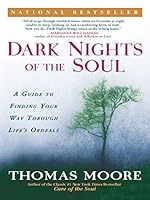
Dark Nights of the Soul

In his extraordinary book on the soul and love, The Myth of Analysis, James Hillman writes that impossible love tortures the soul into a new level of awakening. “Before connection is possible, psyche goes through the dark night of the soul, that mortification in which it feels the paradoxical agony of a pregnant potential within itself and a sense
... See moreThomas Moore • Dark Nights of the Soul
The great Hartford poet Wallace Stevens once wrote, “Realism is the corruption of reality.” I take this paradoxical adage to mean that whenever you get caught in realism—taking everything factually and on its own terms—you miss the chance to really live. The really real is made up of both fact and the human imagination. If you can’t think, reflect,
... See moreThomas Moore • Dark Nights of the Soul
Know that you are both intelligent and stupid, often in the same moment. Admit to what you desire and what you fear.
Thomas Moore • Dark Nights of the Soul
Psychological interpretations of what I’m calling the dark nights tend to be based on research and lack fresh ideas. Religious interpretations are based on beliefs, and they tend to be highly slanted and moralistic. Political solutions are almost all ideological. You can’t even trust your friends to give you an objective picture because they have
... See moreThomas Moore • Dark Nights of the Soul
covered over was it by his exaggerated sense of himself. You knew he was suffering, but you weren’t sure that he knew. Anne Sexton certainly knew. I think Glenn Gould knew himself very well, but he kept that
Thomas Moore • Dark Nights of the Soul
The many Sufi stories about the mullah Nasrudin teach the importance of wit. Among my favorites: Nasrudin goes to a music teacher to take guitar lessons. “That will be ten dollars for the first lesson, and five dollars for each lesson after that,” says the teacher. “Fine,” says Nasrudin, “I’ll start with lesson two.”
Thomas Moore • Dark Nights of the Soul
The sense of irony I am describing is a spiritual attitude rather than a psychological technique. It requires a transcendence of your situation and a vision of things that is far more expansive than the circumstances imply. It asks for a degree of strength and imagination that can only come from a spiritual point of view.
Thomas Moore • Dark Nights of the Soul
The teachings of Jesus, for instance, naturally flow thick with irony, as do most assertions and narratives of the religions. People asked Jesus who was the greatest in the Kingdom of Heaven. He brought a child over to him and said that unless you become like a child, you can’t enter the kingdom. But this is an ironical teaching. Millions of people
... See moreThomas Moore • Dark Nights of the Soul
Some people complain about irony, confusing it, perhaps, with cynicism. They seem to think that too much irony keeps you aloof and insincere. But that isn’t the kind of ironical sensitivity I am talking about. I’m decrying the collapse of a witty, comic understanding of the human condition. My personal preference is a subtle humor and wit, the kind
... See more